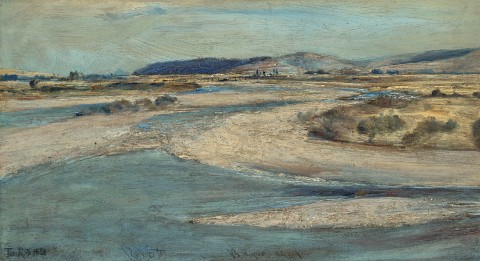RIVER OMEGA, NEW SOUTH WALES, 1901
TOM ROBERTS
oil on wood panel
19.5 x 35.5 cm
signed lower left: Tom Roberts
signed and dated lower centre: Roberts [illeg.] 1901
bears inscription on label verso: RUBIN COLLECTION / Roberts Tom / River Omega
Major Harold de Vahl Rubin, Sydney
Christie’s, Sydney, 4 October 1972, lot 416
Joseph Brown Gallery, Melbourne
Alan Greenway, Australia and USA, acquired from the above in 1972
Thence by descent
Private collection, California, USA
Spring Exhibition 1972: Recent Acquisitions, Joseph Brown Gallery, Melbourne, 8 – 24 November 1972, cat. 19 (illus. in exhibition catalogue)
Topliss, H., Tom Roberts, 1856 – 1931: A Catalogue Raisonné, Oxford University Press, Melbourne, 1985, vol. I, p. 168, cat. 365, vol. II (illus.)
Tom Roberts is renowned in Australian art for his grand vistas of national life, full of the blazing light akin to his fellow Heidelberg artists. However, on closer examination, his palette is more muted than the glare so beloved by Arthur Streeton and in Robert’s smaller works, this becomes even more apparent. Paintings such as Trafalgar Square, c.1884 (Art Gallery of South Australia); Cloud study, c.1889/1901 (National Gallery of Victoria); and Saplings, 1889 (Art Gallery of South Australia) are extremely low key, even foggy, and clearly indicate why he later became so enthusiastic about Clarice Beckett’s paintings which he encountered in in the late 1920s.1 In River Omega, 1901, this delicate sensibility is pronounced in a composition dominated by soft blues and creamy ochre. It is also one of the very few landscapes painted by Roberts during these years.
The Omega Headland is a small promontory 130 kilometres south of Sydney and is near the junction of the Werri Creek where it spills into the Pacific Ocean on the traditional lands of the Dharawal people. Stretching back inland is low-lying alluvial land enriched by ancient eruptions from Saddleback Mountain which rises in the distance. The native cedar trees were rapidly logged by early European settlers who cleared much of the forest to establish dairy farms. Later residents further altered the land by blasting rocks near the headland to build a concrete channel to admit tidal waters into the creek.2 Another artist attracted to the area was Lloyd Rees who painted there from 1939 and some of his many views of the region bear a striking resemblance to Robert’s River Omega, including Omega pastoral, 1950 (Art Gallery of New South Wales), and Sea at Omega, 1957 (Tasmanian Museum and Art Gallery). Like Rees, Roberts stood on the sands between the creek and ocean, looking inland, a view encompassing the sinuous twists of the creek, sand banks, sparse trees and the hills beyond. The modest scale of the wooden panel concentrates the detail and indicates that River Omega was probably started en plein air before being finished in the studio.
One reason for the small number of landscapes painted by Roberts at the time was the continuing effects of the 1890s depression and his major key to survival were portrait commissions. ‘“Portraits pay, George my boy,” the dear chap would say, as he would soften the red tint on the nose of a politician.’3 River Omega is the only landscape from 1901 recorded in Helen Topliss’ catalogue raisonné, but another of a slightly smaller size – Near Ballina, 1901, oil on wood panel, 19 x 35.5 cm, owned by Norman Schurek – was also recorded in the catalogue for the artist’s retrospective exhibition at the Art Gallery of South Australia in 1947. In spite of its scale, Roberts took great pride in these paintings and carried a number with him to London in 1903, where he wrote in 1909 that they ‘(hold) up with all my late stuff and they with it. A kind of touchstone and I didn’t know it.’4 For many years, River Omega was owned by the eccentric grazier, The Honourable Major Harold de Vahl, whose sprawling collection included other works by Roberts as well as examples by Picasso, Degas, Renoir, Dobell and Streeton amongst many others.
1. Robert’s Sunrise, Tasmania, c.1928 (Tasmanian Museum and Art Gallery) is claimed to be his direct response to seeing Beckett’s paintings.
2. See Rees, L., & Free, R., Lloyd Rees: an artist remembers, Craftsman House, Sydney, 1987, p. 57
3. Taylor, G., Those were the days, Tyrell’s, Sydney, 1918, p. 100
4. Tom Roberts, letter to S.W. Pring, 11 February 1909, Mitchell Library, Sydney, MLMSS 1367/2
ANDREW GAYNOR
